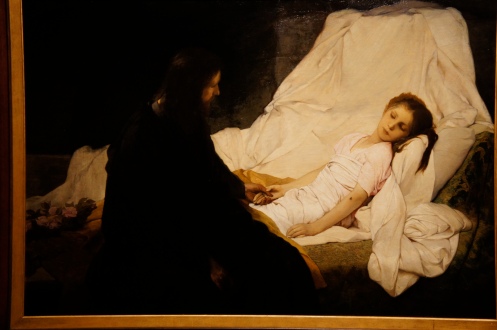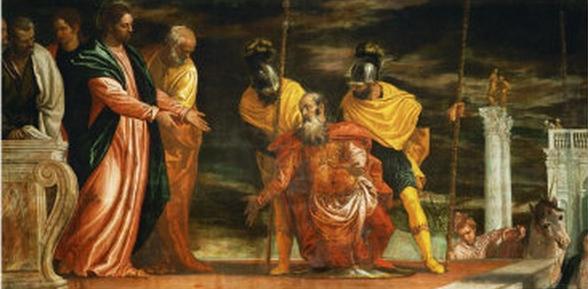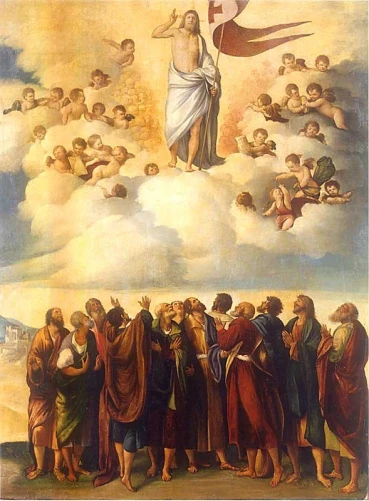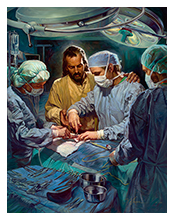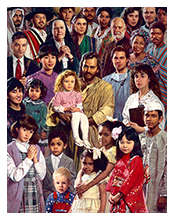Jesus Prayed for His Disciples
Our essential question should be why does God have faith in me instead of why do I have faith in God!
John 17: 1-26 After Jesus said this, he looked toward heaven and prayed: “Father, the hour has come. Glorify your Son, that your Son may glorify you. 2 For you granted him authority over all people that he might give eternal life to all those you have given him. 3 Now this is eternal life: that they know you, the only true God, and Jesus Christ, whom you have sent. 4 I have brought you glory on earth by finishing the work you gave me to do. 5 And now, Father, glorify me in your presence with the glory I had with you before the world began.
Jesus Prays for His Disciples
6 “I have revealed you to those whom you gave me out of the world. They were yours; you gave them to me and they have obeyed your word. 7 Now they know that everything you have given me comes from you. 8 For I gave them the words you gave me and they accepted them. They knew with certainty that I came from you, and they believed that you sent me. 9 I pray for them. I am not praying for the world, but for those you have given me, for they are yours. 10 All I have is yours, and all you have is mine. And glory has come to me through them. 11 I will remain in the world no longer, but they are still in the world, and I am coming to you. Holy Father, protect them by the power of your name, the name you gave me, so that they may be one as we are one. 12 While I was with them, I protected them and kept them safe by that name you gave me. None has been lost except the one doomed to destruction so that Scripture would be fulfilled.
13 “I am coming to you now, but I say these things while I am still in the world, so that they may have the full measure of my joy within them. 14 I have given them your word and the world has hated them, for they are not of the world any more than I am of the world. 15 My prayer is not that you take them out of the world but that you protect them from the evil one. 16 They are not of the world, even as I am not of it. 17 Sanctify them by the truth; your word is truth. 18 As you sent me into the world, I have sent them into the world. 19 For them I sanctify myself, that they too may be truly sanctified.
Jesus Prays for All Believers
20 “My prayer is not for them alone. I pray also for those who will believe in me through their message, 21 that all of them may be one, Father, just as you are in me and I am in you. May they also be in us so that the world may believe that you have sent me. 22 I have given them the glory that you gave me, that they may be one as we are one— 23 I in them and you in me—so that they may be brought to complete unity. Then the world will know that you sent me and have loved them even as you have loved me.
24 “Father, I want those you have given me to be with me where I am, and to see my glory, the glory you have given me because you loved me before the creation of the world.
25 “Righteous Father, though the world does not know you, I know you, and they know that you have sent me. 26 I have made you known to them, and will continue to make you known in order that the love you have for me may be in them and that I myself may be in them.”

Head of Christ by Warner Sallman (1940)
With over 500 million copies printed, this is the image of Jesus Christ (wavy hair, pensive, radiant) that people have embedded in their memory. It is a popular picture found on greeting cards, church bulletins, announcements, and public areas. The image conveys Christ’s righteousness, power, reverence, love, and compassion.
Warner Sallman’s parents were immigrants from Sweden and Finland who lived in Chicago. In addition to the Head of Christ his paintings include Christ Our Pilot and The Lord is My Shepherd.
Luther: In 1528, between August 8 and October 31, Luther wrote a series of sermons on this prayer. We see in the words excerpted from his sermons that Jesus Christ was part of God’s creation, that even though God is present everywhere, the work of Jesus Christ was to save us from sin. The perspective of Luther in the words below is that whatever challenge we face, we have a friend in Jesus who is praying for us! Luther understands our faith in Jesus Christ as the knowledge God reveals to us that He is a God of abundant love and mercy. This knowledge is revealed to us in v. 15-19; “15 My prayer is not that you take them out of the world but that you protect them from the evil one. 16 They are not of the world, even as I am not of it. 17 Sanctify them by the truth; your word is truth. 18 As you sent me into the world, I have sent them into the world. 19 For them I sanctify myself, that they too may be truly sanctified.”
“Consider thou and fully weigh the reason why Christ came, and what He did for the world—He came down from heaven, and was made man, that He might finish the work which the Father gave Him to do (as you will find He Himself hereafter saith); that is, that he might take the sins of the whole world upon himself, and might die to blot them out, and to appease the wrath of the Father; and that he might in His own person overcome death and the devil, and redeem us unto Himself.”
“If God is so omnipresent, how, then, could Christ say that He was going out of the world?”
Luther answered: “This question may be answered and in two ways. In one way, according to frothy, human wisdom, that He has ascended upon high, and sits above as in a swallows’ nest….But I, according to the Scripture, give this answer, and say that ‘in the world’ means to be in its external and sensible state, that is, to enjoy this life which the world enjoys, which is called the natural life in which we eat, drink, sleep, labor, and take care of our families; in a word, in which we make use of the world; and all things necessary unto this life….Therefore He (Christ) no longer lives a life after the manner of this world; that is, He no longer is in a corporal life, which is to be supported by meat, drink, and other corporal necessities.
But we say, that we are to hear that word from the mouth of Christ only. He that hears and believes this, has rightly the truth of God which sanctifies without believing His word, then you can hold fast no hope or confidence in your own reason and wisdom, nor in your strength and works; nor can you arrogate to yourself any holiness because of them, as to be able to avail before God. Therefore, those that are of this mind cannot be proud and arrogant; for they can find nothing in themselves, on account of which they can boast. And you see, that unfeigned humility always follows where there is unfeigned faith. And, true patience and love to the fellow believers upon true humility. When we are under the influence of this, we despise no one, we serve and are kind to all; and whatever evil comes upon us, we endure it with a patient mind; we are not wrathful, nor do we revenge injuries, when we meet ingratitude, perfidy, grief, ignoring, and reproach.”
Comments: hbitten@reverendluther.org
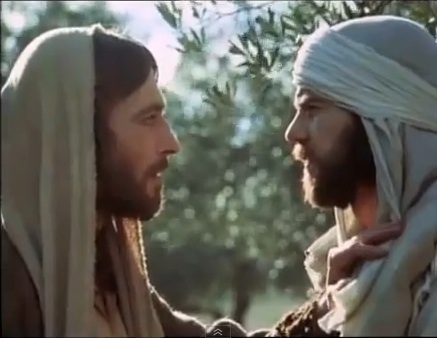
 Being an active disciple is sharing our lives with a friend and ice cream and coffee
Being an active disciple is sharing our lives with a friend and ice cream and coffee


